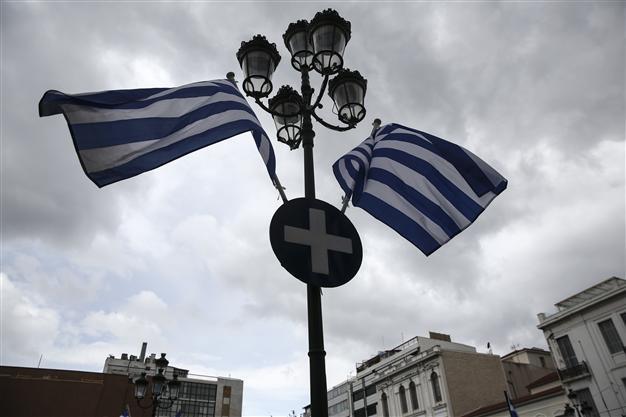Greece meets April IMF payment, but uncertainty reigns
ATHENS - Agence France-Presse

Greek flags fly over central Metropoleos square in Athens, on Thursday, April 9, 2015. AP Photo
Greece on April 9 made a 459 million euro ($495 million) loan payment to the IMF after days of uncertainty, but that failed to fully dispel market concerns over its ability to honour its debts.
As the Greek finance ministry said the payment had been authorised, and Athens announced a fresh debt sale to raise cash, Prime Minister Alexis Tsipras called for an "honourable compromise" that would reopen Greek access to EU-IMF loans.
"I am confident that despite the difficulties, all the forces will come to an honourable compromise," Tsipras said from Moscow during a two-day official visit.
Tsipras' decision to hold talks with Russian President Vladimir Putin -- while his government is locked in loan talks with its EU peers -- has irritated Greece's European partners.
Athens is trying to persuade the EU and IMF to continue lending it money while easing austerity requirements in order to boost economic growth.
After talks with Putin on Wednesday, Tsipras is to meet Russian Prime Minister Dmitry Medvedev Thursday for further discussions.
Speaking to students at the Moscow State Institute of International Relations, Tsipras said his priority remained to reach a deal with the EU and keep Greece in the euro.
"The goal of the government is for Greece to remain in the euro. To remain in the eurozone. We consider this problem facing us a common European problem and for this reason we seek a joint European solution," the 40-year-old PM said.
Experts from the IMF and the European Union are scrutinising a list of economic reforms proposed by Athens in a bid to unlock another 7.2 billion euros in loans to stave off possible bankruptcy.
The Greek government has insisted it can meet its payments, but Tsipras himself fuelled market fears when he warned German Chancellor Angela Merkel in a letter last month that Athens would not be able to service its debt without more financial help from the European Union.
Later this month, Athens has to make interest payments of nearly 400 million euros and roll over 2.4 billion euros in six- and three-month treasury bills due to mature on April 14 and 17.
Athens on Wednesday raised 1.14 billion euros in six-month treasury bills. On Thursday it announced the sale of another 625 million euros in three-month bills next week.
Greek banks are dependent on the European Central Bank for financing, but the eurozone's central bank no longer accepts Greek sovereign bonds as collateral for loans.
Since 2010, Athens has received two successive loan packages from the EU and the IMF worth up to a total 240 billion euros in exchange for tough austerity measures and sweeping economic reforms.
In Tsipras' meeting with Putin on Wednesday, warm words were exchanged and a vague "joint action plan" on cooperation was agreed upon, with Putin insisting Athens has not asked for financial aid and that a Russian embargo on Greek produce would remain as part of a wider ban on EU agricultural imports.
Greece has been particularly hard-hit by the embargo slapped down last year in retaliation for sanctions imposed by the bloc against Moscow, as more than 40 percent of its exports to Russia were farm products.
In a sign of potential compromise, a proposal to set up joint Russian-Greek companies based in Russia that would provide a loophole in the ban were mooted on Wednesday by a Greek government source, under which Greek fruits and vegetables would not be considered as exports.
"There is a desire from both sides to launch a procedure whereby Russia-based joint companies for Greek exporters of agricultural products," said the source.
Greece and Russia had talked up the possibility of closer economic ties between the two Christian Orthodox nations ahead of the visit.
Also prominent among the issues on the agenda on Wednesday was gas and energy cooperation, with Putin and Tsipras mentioning the possibility of Greek involvement in Moscow's new Turkish Stream pipeline project.
The Greek PM is expected to return to Russia for an economic forum in Saint-Petersburg on June 18-20.
But Greek media reports said Tsipras would no longer attend Russia's WWII victory anniversary commemorations in May, and would be replaced by Greek President Procopis Pavlopoulos.
Back in Brussels, eurozone experts were due to begin the second day of a working meeting Thursday on Greece's reform plans submitted at the end of March.
The discussions were only making "small steps", even "baby steps", a source close to the negotiations said Wednesday.
